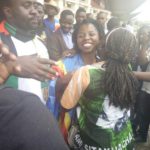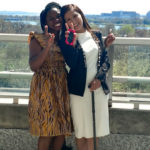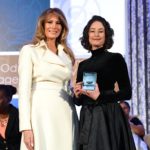A few months ago I came back from lunch and noticed a new file sitting on my desk. Recognizing it as a new International Visitor Leadership Project (IVLP) assignment, I looked for the title and saw four letters: “IWOC”. Having no idea what that meant, I thought “Huh, strange.” Little did I know that I had been given the opportunity to work on one of the most inspiring public diplomacy programs that the State Department sponsors: The Secretary’s International Women of Courage (IWOC) Award. This annual two-week IVLP honors a visionary group of women for their respective work in advancing women’s rights all over the world.
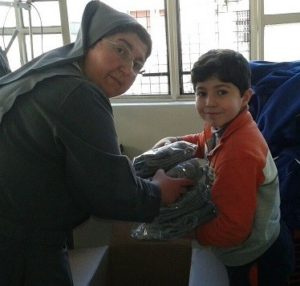
The backgrounds of the 13 IWOC awardees were sent ahead of their arrival and revealed the singular nature of the program. A Colombian woman who survived an acid attack that severely burned 24% of her body has since successfully campaigned to enact stronger punitive measures against acid attack perpetrators; a basketball player on the Botswana national women’s team who survived a “passion killing” attack that left her paralyzed from the waist down now speaks out against gender-based violence and advocates for the rights of disabled women; a Salesian nun from Syria runs a nursery school and works with traumatized children and vulnerable, displaced women. I was overwhelmed by these 13 bios, each account of bravery and fortitude as inspiring as the last (read the official biographies of the 2017 IWOC awardees here).
To kick-off the program, the State Department and Meridian IWOC programming teams met with the women for a formal introduction to the program; it was immediately apparent why they had been nominated for this award. Confidence and compassion emanated from them, a protective aura shielding from dissenters. As I talked with each awardee, I quickly realized a small biographic blurb was vastly insufficient to describe the resilient people in the room with me. The official biographies did not detail Natalia Ponce de León’s sharp wit and sense of humor. Nor did they describe how Saadet Özkan’s infectious smile seemed to tug the corners of my own mouth upwards in return. They didn’t even give me a heads-up that Sister Carol followed the NBA from Syria and was quite keen to go to a game while in the U.S.
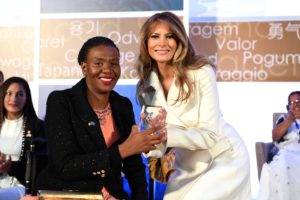
A few days after the opening of the program, the IWOC honorees traveled to the Department of State’s headquarters for the official ceremony recognizing their achievements in furthering human rights around the world. After remarks by Deputy Secretary of State for Political Affairs, Ambassador Thomas Shannon, First Lady Melania Trump delivered a speech commemorating the dauntless actions of the women with whom she shared the stage. Afterwards, she presented each participant the 2017 International Women of Courage award. An elegant reception was held afterwards at the Benjamin Franklin State Dining Room, but there would be no rest for the 2017 IWOC awardees—everyone wanted to meet or interview them.
After a few more days in DC that included a panel at George Washington University’s Global Women’s Institute, in-depth briefings with regional State Department offices, and a tour of the White House (during which they happened to bump into Press Secretary Sean Spicer), the visitors splintered off and flew to separate cities around the country for individualized programming. In their respective cities, the awardees met with resources specializing in the women’s professional topics of interest.
In addition to meeting with these professional resources, the women began to explore American culture. Each host city offered a unique view of America, from the picturesque ocean and beaches of Pensacola, Florida, to the sprawling urban landscape of New York City. Each awardee enthusiastically sought to participate in a variety of cultural events while in the U.S. While in Minneapolis, Sister Carol fulfilled her wish to see an NBA game, corralling a fellow-IWOC awardee from Iraq, Jannat Al-Ghezi, into joining her at a Minnesota Timberwolves game. Meanwhile, Papua New Guinean Veronica Simogun visited a botanical garden in Pittsburgh, and Malebogo Molefhe of Botswana experienced her first snowfall in Denver. But the visits were by no means a one-sided cultural exchange; each IWOC awardee spoke frequently of her own native culture. Rebecca Kabugho taught citizens of Des Moines the salute used by members of her protest group, La Lucha, as well as a Swahili chant used during demonstration marches in the Democratic Republic of the Congo.

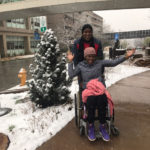
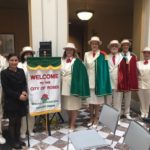
After several days of meetings and cultural experiences, the IWOC awardees departed their respective cities and reconvened in Los Angeles. A reception hosted by the nonprofit American Women for International Understanding celebrated the awardees and presented each with a generous grant to continue and expand their missions of empowering women. The IWOC group also met with the Director of the State Department’s Office of International Visitors, Stacy White, and Chief of IVLP’s On-Demand Division, Alison Moylan, to share their impressions of the project and reflect on personal and professional “next steps.”
By the end of the program, shared experiences had created enduring bonds. Although the awardees looked forward to returning to their families and work back home, it would not be an easy goodbye. After an intense program, they enjoyed one last day together at the Universal Studios.
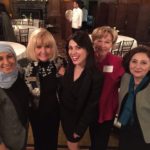
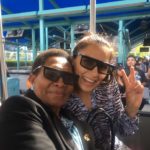
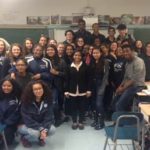
The outcomes of the 2017 IWOC program are immeasurable. Going forward, these powerful women will empower thousands—perhaps millions—of lives. Nigerian Major Aichatou Ousmane Issaka’s IVLP experience will help her better treat those with PTSD in the Nigerian military and the U.N. peacekeeping forces. Awardee Sandya Ekneligoda returned to Sri Lanka determined to draw upon her experience in the United States to help families search for their missing loved ones and achieve justice. TIME Magazine recently named IWOC awardee Arlette Contreras as one of the 100 most influential people in 2017 for her continued work in advocating against gender-based violence.
It was an incredible honor to work on the program, but it was an even greater honor to meet the individuals on the front-line of the battle for human rights. Be sure to remember the names of each one—this isn’t the last you’ll hear of them.
